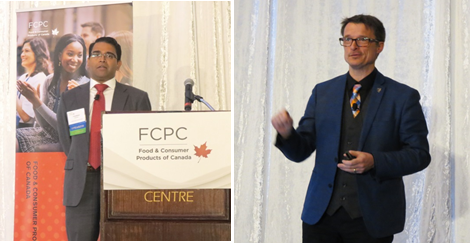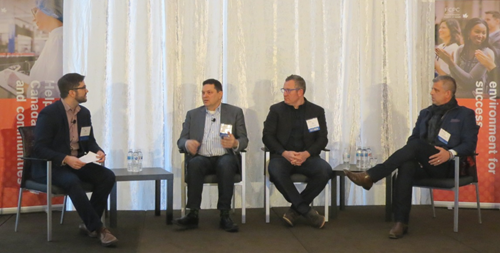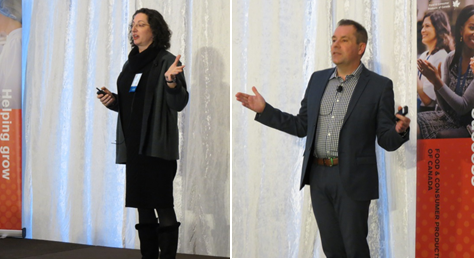With Canada due to legalize cannabis edibles on Oct. 17, 2019, interest and enthusiasm is high among food, beverage and CPG executives eager to grab a slice of the multimillion dollar market. Three Canadians in ten said they are interested in trying edibles when they’re available, as a share of the adult population, that works out to 8.7-million people.
That enthusiasm took center stage at FCPC’s first ever cannabis event on January 31st where more than 130 industry executives seized the opportunity to engage with experts on a wide range of regulatory, social and business development issues. Each session within the event drew a considerable amount of questions and comments as participants look to adapt and position their businesses for success in the fall.
“There is no denying that the edibles market represents an exceptional business opportunity,” explained Chandimal Nicholas, Counsel at Cassels, Brock & Blackwell LLP. “However that opportunity arrives this October with a variety of legal hurdles facing manufacturers; cool is off the table,” said Nicholas when asked about marketing restrictions. “We thought [cannabis] would be treated like alcohol, instead it is being treated like tobacco.” Nicholas recommended manufacturers source professional guidance about the unique challenges in Canada; companies need to understand the rules and the risks associated with stepping outside those rules.

Sylvain Charlebois, Professor, Food Distribution and Policy, Dalhousie University, gave an overview of Dalhousie’s recent survey measuring food and beverage industry perceptions regarding edibles. “Over 40% of businesses are still concerned with the risks associated with making cannabis products,” said Charlebois. “It will take time for stigma and misinformation to dissipate.”
Charlebois also referenced the regulatory challenges of moving into the edibles marketplace. “As the market matures, I expect regulations to loosen up, but not this year…if we take the new Food Guide as an example of how Health Canada operates, I don’t expect industry input will be taken into consideration.”
The afternoon panel had more optimistic views about the regulatory environment. The panel consisted of moderator Mark Rendell, Reporter, Cannabis Industry, The Globe and Mail, Joe Hodas, Chief Operating Officer, General Cannabis Corp., Terence Donnelly, Chairman & Chief Executive Officer, Hill Street Beverages and Peter Neal, Co-Founder, Neal Brothers Foods. A benefit of strict regulations is that it encourages consumption. “Edibles can be really powerful. If someone has a bad experience with your product, they won’t use it again,” said Donnelly.

Neal added, “We have to remember, Health Canada’s mandate is to get rid of the black market and to keep out of the hands of children, not to create a new market. The government wants to see this done right and they need us to be successful.”
When asked about innovation in the edibles sector, Hodas responded, “We have gotten better at understanding how we digest THC, putting certain fats with the THC helps for absorption. I know we can get there with additional research and dollars. There are hurdles facing this industry that distract us from being able to do important R&D and development work, such as legalization efforts and regulatory challenges.”
“One in five Canadian adults have legally consumed cannabis,” explained Carman Allison VP of Consumer Insights, Nielsen Canada, who took us through highlights from his study Understanding Legal Cannabis Consumption and Potential in Canada. The study also looked at how Cannabis edibles have the potential to impact other categories. Respondents said they were likely to consume more salty snacks and chocolate/candy, however, they may be less likely to consume over-the-counter pain medication and alcohol.

Sarah Wilner PhD, Professor of Marketing and Chair, Brand Communications, Wilfrid Laurier University’s School of Business and Economics, shared insights about the new cannabis consumer from her U.S. study of the recreational market. She shared qualitative data about how consumers are using cannabis in different ways and their reactions to different products and delivery methods.
“Consumers with less knowledge about the category are most persuaded by new product forms, especially those that remove pain points, said Wilner. “We aren’t just talking about cannabis consumers we are talking about households. How can a product help you consume discreetly?” Removing negative associations like smoke and smell, decreasing intimidation through familiarity and providing product education will create opportunities for this industry.
The day wrapped-up with a final thought from Michael Graydon, CEO at FCPC. Although the regulations seem strict, so are the regulations for food manufacturing and what is the result? We have the safest food in the world; that is not a bad reputation to have in this category as well.
FCPC will continue to lobby on our members’ behalf and look forward to submitting comments to Health Canada’s cannabis edibles consultation.